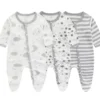Breastfeeding is widely celebrated for its numerous benefits to both mother and child, promoting bonding, nutrition, and immune support. However, many new mothers have questions about its impact on their health, particularly regarding oral health. One common concern is, “Can breastfeeding cause tooth decay in mother?” In this article, we will explore the relationship between breastfeeding, hormonal changes, nutrition, and maternal dental health.
Understanding Tooth Decay
Tooth decay, also known as dental caries, occurs when the hard surface of the teeth is damaged by acids produced by bacteria. This process begins with the formation of plaque, a sticky film of bacteria that forms on teeth after eating. If plaque is not removed through brushing and flossing, it can lead to cavities, gum disease, and other dental issues.
Several factors contribute to the development of tooth decay, including:
- Bacteria: The presence of harmful bacteria in the mouth is a primary cause of tooth decay.
- Diet: High sugar and carbohydrate intake can increase the risk of cavities, as bacteria feed on sugars to produce acids.
- Oral Hygiene: Poor oral hygiene practices can allow plaque to accumulate, leading to decay.
- Saliva Production: Saliva helps neutralize acids and wash away food particles; decreased saliva flow can contribute to tooth decay.
The Role of Breastfeeding in Maternal Health
Breastfeeding has numerous benefits for mothers, including promoting faster recovery after childbirth, aiding in weight loss, and lowering the risk of certain diseases. However, it also comes with increased nutritional demands, which can impact oral health.
During breastfeeding, a mother’s body requires more nutrients to support milk production, leading to increased caloric and nutritional needs. This change raises the question of how these demands influence dental health and whether breastfeeding could potentially lead to tooth decay.
Hormonal Changes During Breastfeeding
Breastfeeding induces significant hormonal changes in a woman’s body, primarily through the release of hormones like prolactin and oxytocin. These hormones are essential for milk production and let-down, but they also affect oral health.
- Estrogen and Progesterone: During breastfeeding, levels of estrogen and progesterone fluctuate. These hormones can influence gum health, potentially leading to pregnancy-related gum disease or gingivitis. Women who experience swollen or bleeding gums during breastfeeding may be at an increased risk for dental issues.
- Salivary Changes: Hormonal fluctuations can also affect saliva production. Reduced saliva flow may lead to a dry mouth, which increases the risk of tooth decay, as saliva is crucial for neutralizing acids and washing away food particles.
- Sensitivity: Some mothers report increased sensitivity in their teeth during breastfeeding, which could impact their oral hygiene practices and lead to neglect in dental care.
Nutritional Needs for Nursing Mothers
Breastfeeding mothers have heightened nutritional requirements to support both their health and that of their baby. Key nutrients include:
- Calcium: Essential for strong teeth and bones, calcium is crucial during lactation. Insufficient calcium intake may lead to decreased bone density and negatively impact dental health.
- Vitamin D: This vitamin helps the body absorb calcium effectively. A deficiency in vitamin D can lead to weaker teeth and increased susceptibility to decay.
- B Vitamins: These are important for energy metabolism and overall health. Certain B vitamins, like B12 and B6, play a role in oral health.
- Hydration: Staying well-hydrated is essential for maintaining saliva production, which protects against decay.
A well-balanced diet rich in these nutrients is vital for nursing mothers to help prevent tooth decay and maintain overall health.
Research and Expert Opinions
While specific research on the direct link between breastfeeding and tooth decay in mothers is limited, dental experts generally agree on the importance of maintaining good oral health during lactation.
According to studies, mothers who practice good oral hygiene, maintain a balanced diet and regularly visit their dentist are less likely to experience tooth decay, regardless of whether they breastfeed. Moreover, a lactation consultant or dental professional may recommend that mothers be proactive about their dental health, especially during the breastfeeding period.
Tips for Maintaining Oral Health While Breastfeeding
To promote optimal oral health during breastfeeding, mothers can follow these practical tips:
- Practice Good Oral Hygiene: Brush teeth at least twice a day with fluoride toothpaste and floss daily to remove plaque and food particles.
- Stay Hydrated: Drink plenty of water to help maintain saliva production and prevent dry mouth.
- Eat a Balanced Diet: Incorporate calcium-rich foods (like dairy products, leafy greens, and nuts), along with a variety of fruits, vegetables, and whole grains to ensure adequate nutrition.
- Limit Sugar Intake: Reduce consumption of sugary snacks and drinks that can contribute to tooth decay.
- Regular Dental Visits: Schedule regular dental check-ups and cleanings, especially during breastfeeding, to monitor and maintain oral health.
When to Seek Professional Help
Breastfeeding mothers should be vigilant about any signs of dental issues. Common signs to watch for include:
- Persistent tooth pain or sensitivity
- Swollen or bleeding gums
- Changes in the appearance of teeth
- Difficulty in chewing or biting
If any of these symptoms occur, it is crucial to consult a dentist for evaluation and treatment. Regular dental check-ups can also help prevent issues before they escalate.
Conclusion
The question, “Can breastfeeding cause tooth decay in mother?” is complex and multifaceted. While breastfeeding itself does not directly cause tooth decay, the hormonal changes and increased nutritional demands during this period can influence a mother’s oral health.
By maintaining good oral hygiene, eating a balanced diet, and staying hydrated, breastfeeding mothers can significantly reduce the risk of tooth decay. Additionally, consulting with healthcare providers about any concerns can help ensure both maternal and infant health during this important time.
FAQ’s
- Can breastfeeding directly cause tooth decay in mothers?
A. No, breastfeeding does not directly cause tooth decay. However, hormonal changes and increased nutritional needs during this time can impact oral health. - What are the common signs of tooth decay?
A. Common signs of tooth decay include tooth sensitivity, visible holes or pits in teeth, persistent pain, and swollen or bleeding gums. - How can hormonal changes during breastfeeding affect dental health?
A. Hormonal fluctuations can lead to changes in gum health, sensitivity, and saliva production, which may increase the risk of dental issues. - What dietary changes can nursing mothers make to improve oral health?
A. Nursing mothers should focus on a balanced diet rich in calcium, vitamin D, and other essential nutrients while limiting sugary snacks and beverages. - When should I see a dentist if I’m breastfeeding?
A. If you experience any signs of dental issues or have concerns about your oral health, it is advisable to consult a dentist for an evaluation. Regular dental check-ups are also important during and after breastfeeding.









